动词单三变化规律及练习题(小学五年级)汇编
完整版)动词单三变化规律及练习题(小学五年级)

完整版)动词单三变化规律及练习题(小学五年级)XXXThere are three forms of verb third person XXX.1) For regular verbs。
add -s to the end of the word。
After a voiceless consonant。
-XXX。
XXX。
it is pronounced /z/。
For words ending in -d or -t。
add -s pronounced /dz/ or /ts/。
respectively。
For example:help→XXX。
know→knows /nuz/。
get→gets /gets/。
read→reads /ridz/2) For verbs ending in the letters s。
x。
ch。
sh。
or some ending in o。
add -es。
The -es is XXX:XXX'siz/。
fix→fixes /'fiksiz/。
XXX→teaches / /bʌziz/。
wash→washes /wɒʃiz/Note: go→goes /gəʊz/。
do→does /dʌz/3) For verbs XXX + y。
change the y to i and add -es。
The -es is XXX:carry→carries /'kæriz/。
fly→XXX/Note: for words like play→plays /pleiz/。
say→says /sez/。
where the y is XXX。
simply add -s to form the third person singular.4) There are some special verbs that are ns to these rules。
小学英语一般现在时三单动词的变化规则及练习题

在句子中,一般现在时三单动词的变化规则可以用来描述事实、表达观点 或传达信息。
通过使用一般现在时三单动词的变化规则,可以使句子更加简洁、明了, 易于理解。
在英语学习中,掌握一般现在时三单动词的变化规则在实际中的应用非常 重要,可以提高语言表达能力。
一般现在时三单 动词的变化练习
题
单选练习题
一般现在时态中,动词第三人称单数的变化规则是:A. 动词原形 B. 动词+s C. 动词+es D. 动词+ing
下列句子中,动词形式正确的是:A. He like playing basketball B. She goes to school at 7:00 every day C. They like to eat apples D. We don't like to play in the rain
在日常交流中的应用
描述日常行为和习惯
表达经常发生的动作或状态
描述事物的性质和特征
表达个人的喜好和意愿
在写作中的应用
描述日常行为和习惯
表达个人观点和喜好
描述事件和经历
编写故事和虚构情境
感谢您的观看
汇报人:XX
下列句子中,动词形式不正确的是:A. He plays basketball every day B. She eats an apple every morning C. They like eat apples D. We don't like to play in the rain
下列句子中,动词形式正确的是:A. He doesn't like to eat vegetables B. She doesn't like playing the piano C. They don't like to read books D. We don't like eating apples
动词三单的变化规则及练习

--动词三单的变化规则及练习规则:1.一般情况下,直接加-s ,如: cook-cooks, milk-milks2.以 s. x. sh. ch. o 结尾,加-es ,如:guess-guesses, wash-washes, watch-watches, go-goes3.以“辅音字母 +y”结尾,变 y 为 i, 再加 -es ,如:study-studies练习 : 写出下列动词的第三人称单数 (60 ’)drink ________ go _______ stay ________ make ________look _________ have_______ pass_______ carry ________come________ watch______ plant_______ fly ________study_______ brush________ teach_______填空: (40’)1.He often ________(have) dinner at home.2.Daniel and Tommy _______(be) in Class One.3.We _______(not watch) TV on Monday.4.Nick _______(not go) to the zoo on Sunday.5.______ they ________(like) the World Cup?6.What _______they often _______(do) on Saturdays?7._______ your parents _______(read) newspapers every day?8.The girl _______(teach) us English on Sundays.9.She and I ________(take) a walk together every evening.10.There ________(be) some water in the bottle.11.Mike _______(like) cooking.12.They _______(have) the same hobby.13.My aunt _______(look) after her baby carefully.14.You always _______(do) your homework well.15. I _______(be) ill. I ’ m staying in bed.16.She _______(go) to school from Monday to Friday.17.Liu Tao _______(do) not like PE.18.The child often _______(watch) TV in the evening.19.Su Hai and Su Yang _______(have) eight lessons this term.20.-What day _______(be) it today? - It ’ s Saturday.--。
小学五年级三单形式练习题

小学五年级三单形式练习题第一部分:动词的单数形式动词是表示动作或状态的词语。
在句子中,动词的单数形式用来描述一个人、一个事物或一个概念。
下面是一些练习题,帮助你熟悉动词的单数形式。
1. The cat (play) with a ball.答案:The cat plays with a ball.2. My brother (study) English every day.答案:My brother studies English every day.3. Lily (watch) TV in the living room.答案:Lily watches TV in the living room.4. The bird (fly) high in the sky.答案:The bird flies high in the sky.5. Peter (eat) an apple for breakfast.答案:Peter eats an apple for breakfast.第二部分:动词的第三人称单数形式在英语中,动词的第三人称单数形式是指以“-s”或“-es”结尾的动词形式。
下面是一些练习题,帮助你学习动词的第三人称单数形式。
1. He often (go) to the park on weekends.答案:He often goes to the park on weekends.2. She (teach) math at school.答案:She teaches math at school.3. The dog (bark) loudly at night.答案:The dog barks loudly at night.4. It (rain) heavily outside.答案:It rains heavily outside.5. John (brush) his teeth before bed.答案:John brushes his teeth before bed.第三部分:动词的变化形式动词在不同的时态、情态和人称下会有不同的变化形式。
动词第三人称单数的变化规则讲解及习题练习(附答案)

动词第三人称单数的变化规则讲解及习题练习(附答案)1. 大部分单词可以直接在动词后: +s例:like -- like splay -- play swork--work sread--read swrite--write s发音规则:所加的“s”在清辅音后,发【s】,works在浊辅音及元音后,发【z】,plays在d 后与s 一起发【dz】,reads在t 后与s 一起发【ts】,writes2. 以s, x, sh, ch, 结尾的动词: +es例:watch -- watch esbrush-- brush eswash--wash es发音规则:词尾加的“es”,发【iz】3. 以辅音+o 结尾的动词: +es例:go -- go esdo -- do es发音规则:词尾加的“es”,发【z】,does4. 以辅音+y 结尾的动词: 变y 为i+es例:fly -- fl iesstudy -- stud iescarry--carr ies发音规则:词尾加的“es”,发【iz】,carries5. 不规则变化:例:have -- hasbe 动词的单三形式是:is练习题1. 写出下列动词第三人称单数。
drink ________ go _______stay ________ make _______look ________have_______pass_______ carry ________come_______ watch______plan_______ fly ________study_______ brush________do_________ teach_______2. 用所给单词的适当形式填空。
(1) He ______ (go) to school by bus every morning.(2) Jim _______ (have) many toys.(3) Lucy ______ (study) very hard.She ______ (be) never late for school.(4) Ken _______ (like) his father very much.答案:1.drinks goes stays makes looks has passes carries comes watches plans flies studies brushes does teaches2. (1) goes (2) has (3) studies is (4) likes。
动词单三变化及练习题精选.

动词第三人称单数词尾变化及读音动词第三人称单数词尾变化有三种形式。
(1)一般动词在词尾加-s,-s在清辅音后读/s/,在浊辅音或元音后读/z/ds读/dz/,ts读/ts/。
如:help→helps/helps/,know→knows/n uz/,get→gets/gets/,read→reads/ri dz/(2)以字母s,x,ch,sh或有些以o结尾的动词加-es,-es读/iz/。
如:guess→guesses/'siz/,fix→fixes/'fiksiz/,teach→teaches/'ti t iz/,wash→washes/'w iz/注意:go→goes/uz/,do→does/d z/(3)以辅音字母+y结尾的动词,先变y为i,再加-es,-ies读/iz/。
如:carry→carries/'k riz/,fly→flies/flaiz/注:在play→plays/pleiz/,say→says/sez/中,字母y前为元音字母,第三人称单数形式直接在动词后面加-s。
(4)特殊词例外。
如:be→is,have→has以不发音字母“e”结尾的开音节词,如果尾音是[s],[z]时,加“s”后字母“e”发音,与所加“s”,一起读做[iz]。
如:close-closes [iz]一般现在时练习一.用词的适当形式填空。
1.What time_________ his father_________(do) the work?2.He _________(get) up at five o’clock.3.__________ you _________(brush) your teeth every morning.4.What ________ ( do ) he usually ________( do ) after school?5.Tom ________ ( study ) English, Chinese, Maths, Science and Art at school.6. Kitty sometimes __________(go) to the park with his sister.7.At eight at night, she __________( watch ) TV with her parents.8. ________ Mike________( read ) English every day?9.How many lessons________ your classmates______( have ) on Monday?10.We often___________ ( play ) football in the playground.二.选择() 1. _____ you have a book?A. DoB. AreC. IsD. Have()2. They _________ on a farm.A. workingB. is workC. workD. is worked() 3. Does Peter like to watch TV?__________.A. Yes, he likeB. No, he doesn’tC. Yes, he’d likeD. No, he likes()4. She doesn’t __________ her homework in the afternoon.A. doingB. to doC. doesD. do()5. How ____________ Mr. Brown ___________ to America?A. do,goB. is,goC. does,goD. does,goes()6. Where’s my camera? I____________ it.A. am not findingB. am not seeingC. can’t findD. can’t look at ()7. How ___________ he go to work?He ___________ to work by bike.A. does ;goB. do;goesC. do ;goD. does;goes()8. ______ you usually late for school?No, _____________.A. Do ; I amB. Does ;notC. Are ; I’m notD. Are ; I aren’t()9. _____ she _____ home at six every day?A. Is , leaveB. Does , leaveC. Is , leavesD. Does , left()10. Mr. Yang ____________ English this term.A. teaches ourB. teaches usC. teachs usD. teach our。
(完整版)动词单三变化规律及练习题(五年级)

动词第三人称单数词尾变化及读音动词第三人称单数词尾变化有三种形式。
(1)一般动词在词尾加 -s,-s 在清辅音后读/ s/,在浊辅音或元音后读/ z/ds 读/ dz/, ts 读/ ts/。
如:help→helps/helps/, know→knows/n uz/, get→gets/gets/,read→reads/ri dz/(2)以字母 s,x,ch,sh 或有些以 o 结尾的动词加 -es,-es 读/ iz/。
如:guess→guesses/'siz/, fix →fixes/ 'fiksiz /, teach→ teaches/'ti t iz/, wash→washes/'w iz/注意: go→goes/uz/, do→does/d z/(3)以辅音字母 +y 结尾的动词,先变y 为 i ,再加 -es,-ies 读/ iz/。
如:carry→carries/'k riz/, fly → flies/flaiz /注:在 play→plays/pleiz/, say→says/sez/中,字母 y 前为元音字母,第三人称单数形式直接在动词后边加-s。
(4)特别词例外。
如:be→is,have→has以不发音字母“ e”结尾的开音节词,假如尾音是 [s],[z] 时,加“ s”后字母“ e”发音,与所加“ s”,一同读做 [iz] 。
如:close-closes [iz]一般此刻时练习(一)一、用词的适合形式填空time_________ his father_________(do) the work?2.He _________(get) up at five o’ clock.3.__________ you _________(brush) your teeth every morning?4.What ________ ( do ) he usually ________( do ) after school?5.Tom ________ ( study ) English, Chinese, Maths, Science and Art at school.6. Kitty sometimes __________(go) to the park with his sister.7.At eight at night, she __________( watch ) TV with her parents.8. ________ Mike________( read ) English every day?9.How many lessons________ your classmates______( have ) on Monday?10.We often___________ ( play ) football in the playground.二、选择( ) 1. _____ you have a book?A. DoB. AreC. IsD. Have( )2. They _________ on a farm.A. workingB. is workC. workD. is worked( ) 3. Does Peter like to watch TV?__________.A. Yes, he likeB. No, he doesn’tC.Yes, he’ d likeD. No, he likes ( )4. She doesn’ t __________ her homework in the afternoon.A. doingB. to doC. doesD. do( )5. How ____________ Mr. Brown ___________ to America?A. do,goB. is,goC. does,goD. does,goes( )6. Where’ s my camera? I____________ it.A. am not findingB. am not seeingC. can ’ t findD. can ’ t look at ( )7. How ___________ he go to work?He ___________ to work by bike.A. does ;goB. do;goesC. do ;goD. does;goes( )8. ______ you usually late for school?No, _____________.A. Do ; I amB. Does ;notC. Are ; I ’ m notD. Are ; I aren ’t ( )9. _____ she _____ home at six every day?A. Is , leaveB. Does , leaveC. Is , leavesD. Does , left( )10. Mr. Yang ____________ English this term.A. teaches ourB. teaches usC. teachs usD. teach our一般此刻时练习(二)一、单项选择题1. Jenny ____ in an office. Her parents ____in a hospital.A. work worksB. works workC. work are workingD. is working work2. One of the boys_____ a black hat.A. haveB. there isC. there areD. has3. We will go shopping if it____ tomorrow.A. don't rainB. didn't rainC. doesn't rainD. isn't rain4. He said the sun ____in the east and ____in the west.A. rose; setB. rises; setsC. rises; setD. rise; sets5. Wang Mei ____ music and often ____ to music.A. like; listenB. likes; listensC. like; are listeningD. liking; listen6. Jenny____ English every evening.A. has studyB. studiesC. studyD. studied7. _____Mike from Japan?A. AreB. DoC. Does8. _____you come from Japan?A. AreB. DoC. Does9.What language do you_______?A. sayB. talkC. tellD. speak10.The elephant likes______her friends and _____grass.A. play with; eatB. play with; eatsC. to play with; eatD. to play with; eats二、所给动词的正确形式填空1.I can take Li Ming there when he _____(come) to visit.2._____your sister_____(know)English?3.Her home____ (be) away from her school.4.The pot_____(not look) like yours very much.5.Where _____you____(have)lunch every day?6.Who_____(want)to go swimming?7.______she_____(do) the housework every day?8.Jenny and Danny usually______(play) games in the afternoon .9.______you ______(like) English?10.What______his father_____(do) ?。
三单动词、现在分词的变化规则及练习题

三单动词的变化规则1.一般情况下,直接加-s2.以s. x. sh. ch. o结尾,加-es3.以“辅音字母+y”结尾,变y为i, 再加-es4、特殊情况have变has一般现在时用法专练:一、写出下列动词的第三人称单数drink ________ go _______ stay ________ make ________look _________ have_______ pass_______ carry ____come________ watch______ plant_______ fly ________study_______ brush________ do_________ teach_______二、用括号内动词的适当形式填空。
1. He often ________(have) dinner at home.2. Daniel and Tommy _______(be) in Class One.3. We _______(not watch) TV on Monday.4. Nick _______(not go) to the zoo on Sunday.5. ______ they ________(like) the World Cup6. What _______they often _______(do) on Saturdays7. _______ your parents _______(read) newspapers every day8. The girl _______(teach) us English on Sundays.9. She and I ________(take) a walk together every evening.10. There ________(be) some water in the bottle(瓶子) .11. Mike _______(like) cooking.12. They _______(have) the same hobby.13. My aunt _______(look) after her baby carefully. (look after 照顾、照看)14. You always _______(do) your homework well.15. I _______(be) ill. I’m staying in bed.16. She _______(go) to school from Monday to Friday.17. Liu Tao _______(do) not like PE.18. The child often _______(watch) TV in the evening.19. Su Hai and Su Yang _______(have) eight lessons this term.20. -What day _______(be) it today It’s Saturday.三、按照要求改写句子1. Daniel watches TV every evening.(改为否定句)___________________________________________________2. I do my homework every day.(改为一般疑问句,作否定回答)____________________________________________________________________________________3. She likes milk.(改为一般疑问句,作肯定回答)___________________________________________________________________________________4. Amy likes playing computer games.(改为一般疑问句,作否定回答)____________________________________________________________________________________________5. We go to school every morning.(改为否定句)_______________________________________________________6. He speaks English very well.(改为否定句)___________________________________________________7. John comes from Canada.(对划线部分提问)___________________________________________________8. She is always a good student.(改为一般疑问句,作否定回答)________________________________________________________________________________________9、Simon and Daniel like going skating.(改为否定句)___________________________________________________五、改错(划出错误的地方,将正确的写在横线上)1. Is your brother speak English __________________2. Does he likes going fishing __________________3. He likes play games after class. __________________4. Mr. Wu teachs us English. __________________5. She don’t do her homework on Sundays. _________________现在分词变化规则:1 .一般情况下直接加ingthink---thinking sleep---sleeping study---studyingspeak---speaking say---saying2 .以不发音的字母e结尾的单词,去掉字母e,再加ingwake---waking make---making come---comingtake---taking leave---leaving have---havingdance----dancing ride----riding write---writing※注意※这里的e必须不发音,若发音,则不能去掉,如see→seeing3.以重读闭音节结尾,呈现“辅,元,辅”结构的动词,先双写末尾的辅音字母,再加ing[要判断一个单词是否是重读闭音节,必须同时满足下列三个条件:]1、这个音节必须重读;2、这个单词结尾必须是“辅元辅”,即“辅音字母+元音字母+辅音字母”;3、在这个“辅元辅”中的元音字母必须发短音。
动词第三人称单数变化规则含练习
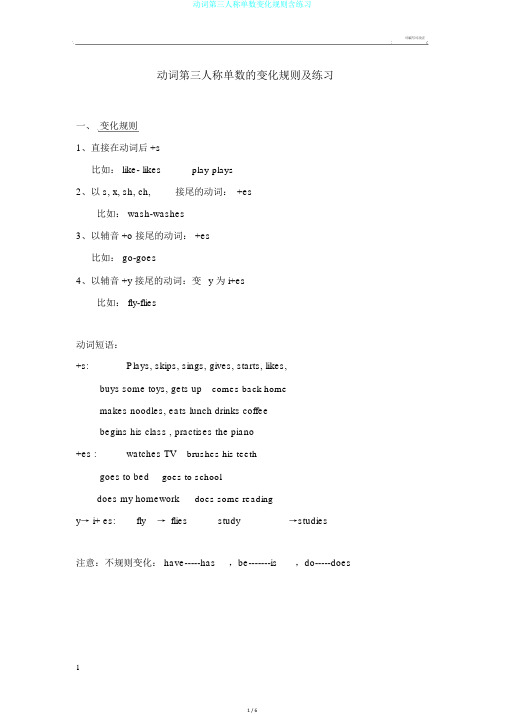
可编写可改正动词第三人称单数的变化规则及练习一、变化规则1、直接在动词后 +s比如: like- likes play-plays2、以 s, x, sh, ch,接尾的动词:+es比如: wash-washes3、以辅音 +o 接尾的动词: +es比如: go-goes4、以辅音 +y 接尾的动词:变y 为 i+es比如: fly-flies动词短语:+s:Plays, skips, sings, gives, starts, likes,buys some toys, gets up comes back homemakes noodles, eats lunch drinks coffeebegins his class , practises the piano+es :watches TV brushes his teethgoes to bed goes to schooldoes my homework does some readingy→ i+ es:fly→ flies study→studies注意:不规则变化: have-----has,be-------is,do-----does可编写可改正写出以下动词的第三人称单数drink ________ go _______ stay ________ make ________look _________ have_______ pass_______carry ____come________watch______ plant_______ fly ________study_______ brush________ do_________teach_______二、请看下边两组句子,注意划分他们的共同点和不一样点。
I go to school every day.I don't go to school every day.He goes to school every day.He doesn't go to school every day.Do you go to school every dayYes, I do. (No, I don't)Does he go to school every dayYes, he does. (No, he doesn't)注:1)第三人称单数用了does后边就不用动词的s 形式了 , 而用动词原形 . 。
动词单三变化规律及练习题(小学五年级)

动词第三人称单数词尾变化及读音动词第三人称单数词尾变化有三种形式。
(1)一般动词在词尾加-s,-s在清辅音后读/s/,在浊辅音或元音后读/z/ds读/dz/,ts读/ts/。
如:help→helps/helps/,know→knows/n uz/,get→gets/gets/,read→reads/ri dz/(2)以字母s,x,ch,sh或有些以o结尾的动词加-es,-es读/iz/。
如:guess→guesses/'siz/,fix→fixes/'fiksiz/,teach→teaches/'ti t iz/,wash→washes/'w iz/注意:go→goes/uz/,do→does/d z/(3)以辅音字母+y结尾的动词,先变y为i,再加-es,-ies读/iz/。
如:carry→carries/'k riz/,fly→flies/flaiz/注:在play→plays/pleiz/,say→says/sez/中,字母y前为元音字母,第三人称单数形式直接在动词后面加-s。
(4)特殊词例外。
如:be→is,have→has以不发音字母“e”结尾的开音节词,如果尾音是[s],[z]时,加“s”后字母“e”发音,与所加“s”,一起读做[iz]。
如:close-closes [iz]一般现在时练习(一)一、用词的适当形式填空1.What time_________ his father_________(do) the work?2.He _________(get) up at five o’clock.3.__________ you _________(brush) your teeth every morning?4.What ________ ( do ) he usually ________( do ) after school?5.Tom ________ ( study ) English, Chinese, Maths, Science and Art at school.6. Kitty sometimes __________(go) to the park with his sister.7.At eight at night, she __________( watch ) TV with her parents.8. ________ Mike________( read ) English every day?9.How many lessons________ your classmates______( have ) on Monday?10.We often___________ ( play ) football in the playground.二、选择() 1. _____ you have a book?A. DoB. AreC. IsD. Have()2. They _________ on a farm.A. workingB. is workC. workD. is worked() 3. Does Peter like to watch TV?__________.A. Yes, he likeB. No, he doesn’tC. Yes, he’d likeD. No, he likes ()4. She doesn’t __________ her homework in the afternoon.A. doingB. to doC. doesD. do()5. How ____________ Mr. Brown ___________ to America?A. do,goB. is,goC. does,goD. does,goes()6. Where’s my camera? I____________ it.A. am not findingB. am not seeingC. can’t findD. can’t look at ()7. How ___________ he go to work?He ___________ to work by bike.A. does ;goB. do;goesC. do ;goD. does;goes()8. ______ you usually late for school?No, _____________.A. Do ; I amB. Does ;notC. Are ; I’m notD. Are ; I aren’t()9. _____ she _____ home at six every day?A. Is , leaveB. Does , leaveC. Is , leavesD. Does , left()10. Mr. Yang ____________ English this term.A.teaches ourB. teaches usC. teachs usD. teach our一般现在时练习(二)一、单项选择题1. Jenny ____ in an office. Her parents ____in a hospital.A. work worksB. works workC. work are workingD. is working work2. One of the boys_____ a black hat.A. haveB. there isC. there areD. has3. We will go shopping if it____ tomorrow.A. don't rainB. didn't rainC. doesn't rainD. isn't rain4. He said the sun ____in the east and ____in the west.A. rose; setB. rises; setsC. rises; setD. rise; sets5. Wang Mei ____ music and often ____ to music.A. like; listenB. likes; listensC. like; are listeningD. liking; listen6. Jenny____ English every evening.A. has studyB. studiesC. studyD. studied7. _____Mike from Japan?A. AreB. DoC. DoesD.Is8. _____you come from Japan?A. AreB. DoC. DoesD.Is9. What language do you_______?A. sayB. talkC. tellD. speak10. The elephant likes______her friends and _____grass.A. play with; eatB. play with; eatsC. to play with; eatD. to play with; eats二、所给动词的正确形式填空1. I can take Li Ming there when he _____(come) to visit.2. _____your sister_____(know)English?3. Her home____ (be) away from her school.4. The pot_____(not look) like yours very much.5. Where _____you____(have)lunch every day?6. Who_____(want)to go swimming?7. ______she_____(do) the housework every day?8. Jenny and Danny usually______(play) games in the afternoon .9. ______you ______(like) English?10. What______his father_____(do) ?。
动词三单的变化规则与练习

动词三单的变化规则与练习一、规则:1、一般情况下直接加s,如speak-speaks, like-likes, play-plays2、以s, x, sh, ch, o 结尾的加es,如wash-washes, go-goes, do-does, watch-watches3、以辅音字母+y 结尾的,改y 为i 再加es,如study-studies,try-tries4、特殊变化,如be-is/was; have-has二、练习题:1. He often ________(have) dinner at home.2. Daniel and Tommy _______(be) in Class One.3. We _______(not watch) TV on Monday.4. Nick _______(not go) to the zoo on Sunday.5. ______ they ________(like) the World Cup?6. What _______they often _______(do) on Saturdays?7. _______ your parents _______(read) newspapers every day?8. The girl _______(teach) us English on Sundays.9. She and I ________(take) a walk together every evening.10. There ________(be) some water in the bottle.11. Mike _______(like) cooking.12. They _______(have) the same hobby.13. My aunt _______(look) after her baby carefully.14. You always _______(do) your homework well.15. I _______(be) ill. I’m staying in bed.16. She _______(go) to school from Monday to Friday.17. Liu Tao _______(do) not like PE.18. The child often _______(watch) TV in the evening.19. Su Hai and Su Yang _______(have) eight lessons this term.20. -What day _______(be) it today? -It’s Saturday.。
(完整版)动词三单+练习题
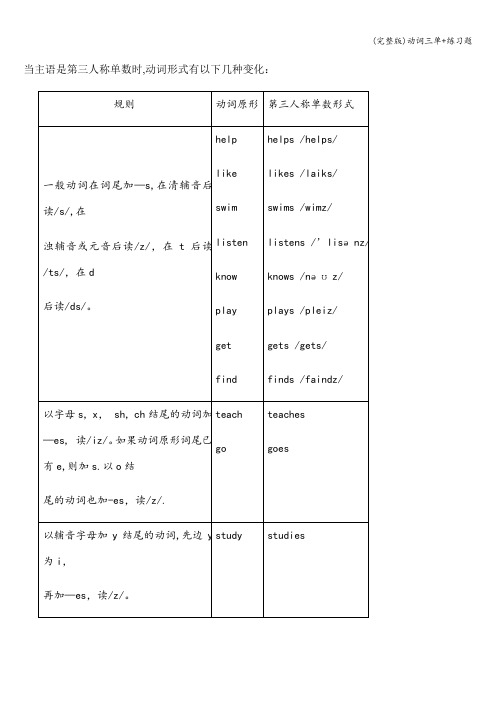
当主语是第三人称单数时,动词形式有以下几种变化:sit—— guess-- die-- go-- rush-- reach——touch——brush-- fly-—copy-—say—- run-- do——fix-- live——cry—- enjoy—- have-—wish—- play-—Tie-—teach-—buy-- study—- drink-—go—- stay——make—- look—- carry—- come—- watch——plant—- fly -- do——二、用括号内动词的适当形式填空。
1. He often ________(have) dinner at home.2. Daniel and Tommy _______(be) in Class One。
3。
We _______(not watch) TV on Monday。
4。
Nick _______(not go) to the zoo on Sunday。
5. ______ they ________(like) the World Cup?6. What _______they often _______(do) on Saturdays?7. _______ your parents _______(read) newspapers every day?8。
The girl _______(teach) us English on Sundays.9. She and I ________(take) a walk together every evening.10. There ________(be) some water in the bottle.11. Mike _______(like) cooking。
12. They _______(have) the same hobby.13。
篇章三单变化规则与练习
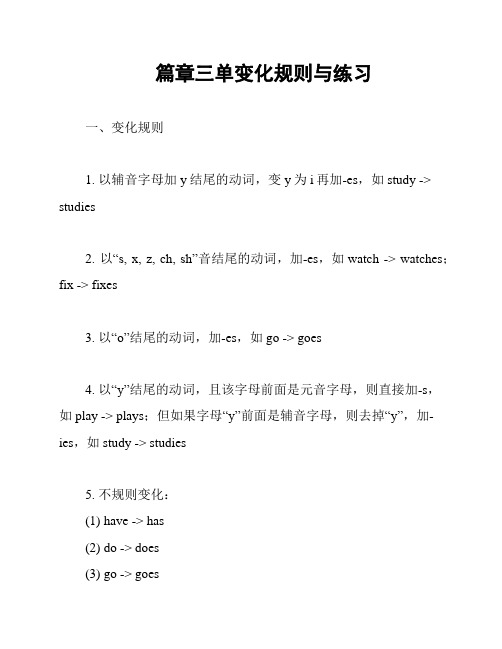
篇章三单变化规则与练习一、变化规则1. 以辅音字母加y结尾的动词,变y为i再加-es,如study -> studies2. 以“s, x, z, ch, sh”音结尾的动词,加-es,如watch -> watches;fix -> fixes3. 以“o”结尾的动词,加-es,如go -> goes4. 以“y”结尾的动词,且该字母前面是元音字母,则直接加-s,如play -> plays;但如果字母“y”前面是辅音字母,则去掉“y”,加-ies,如study -> studies5. 不规则变化:(1) have -> has(2) do -> does(3) go -> goes(4) be -> is二、练填入适当的单词,使句子语法正确1. She ___ (watch) TV every day.答案:watches2. He ___ (carry) a bag of books to the classroom. 答案:carries3. They ___ (teach) English in the university.答案:teach4. The cat ___ (catch) mice every night.答案:catches5. My father ___ (drive) a car to work.答案:drives6. Kate ___ (study) English at school.答案:studies7. Tom ___ (play) basketball with his friends. 答案:plays8. The dog ___ (bark) at the stranger.答案:barks9. She ___ (do) her homework after school. 答案:does10. I ___ (have) a cup of coffee for breakfast. 答案:have。
动词第三人称单数的变化规则及练习

动词第三人称单数的变化规则及练习本文介绍了动词第三人称单数的变化规则,包括直接+s、以s、x、sh、ch结尾的动词加es、以辅音+o结尾的动词加es、以辅音+y结尾的动词变为i+es等。
同时给出了一些动词的变化示例和练。
变化规则:1.直接在动词后+s,如like-likes,play-plays。
2.以s、x、sh、ch结尾的动词加es,如wash-washes。
3.以辅音+o结尾的动词加es,如go-goes。
4.以辅音+y结尾的动词变为i+es,如fly-flies。
动词短语示例:s:plays。
skips。
sings。
gives。
starts。
likes。
buys some toys。
gets up。
comes back home。
makes noodles。
eats lunch。
drinks coffee。
begins his class。
practises the piano。
es:watches TV。
brushes his teeth。
goes to bed。
goes to school。
does my homework。
does some reading。
y→ i+ es:fly → flies。
study → studies。
练:drink - drinks。
go - goes。
stay - stays。
make - makes。
look - looks。
have - has。
pass - passes。
carry - carries。
come - comes。
watch - watches。
plant - plants。
fly - flies。
study - studies。
brush - brushes。
do - does。
teach - teaches。
文章中还介绍了区分肯定句和否定句以及疑问句的常用表达方式,如I go to school every day和I don't go to school every day,He goes to school every day和He doesn't go to schoolevery day,Do you go to school every day?和Yes。
动词第三人称单数形式构成规则及练习题
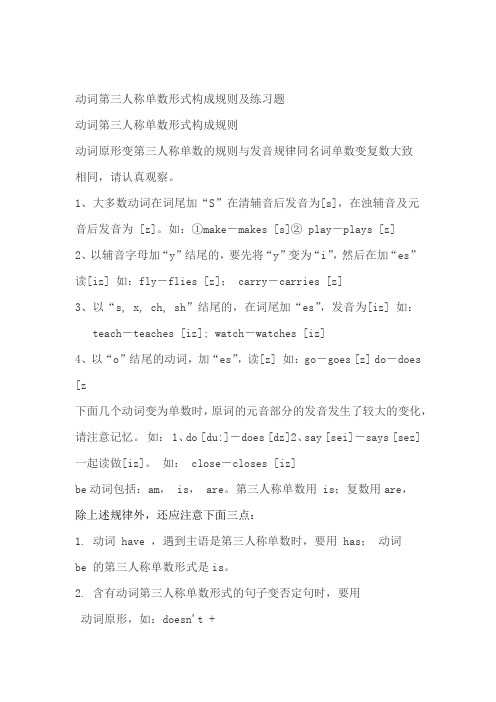
动词第三人称单数形式构成规则及练习题动词第三人称单数形式构成规则动词原形变第三人称单数的规则与发音规律同名词单数变复数大致相同,请认真观察。
1、大多数动词在词尾加“S”在清辅音后发音为[s],在浊辅音及元音后发音为 [z]。
如:①make-makes [s]② play-plays [z]2、以辅音字母加“y”结尾的,要先将“y”变为“i”,然后在加“es”读[iz] 如:fly-flies [z]; carry-carries [z]3、以“s, x, ch, sh”结尾的,在词尾加“es”,发音为[iz] 如:teach-teaches [iz]; watch-watches [iz]4、以“o”结尾的动词,加“es”,读[z] 如:go-goes [z] do-does[z下面几个动词变为单数时,原词的元音部分的发音发生了较大的变化,请注意记忆。
如: 1、do [du:]-does [dz]2、say [sei]-says [sez]一起读做[iz]。
如: close-closes [iz] be动词包括:am, is, are。
第三人称单数用 is;复数用are,除上述规律外,还应注意下面三点:1. 动词 have ,遇到主语是第三人称单数时,要用 has;动词be 的第三人称单数形式是is。
2. 含有动词第三人称单数形式的句子变否定句时,要用动词原形,如:doesn't +He goes to school at six in the morning. (变否定句)→ He doesn't go to school at six in the morning.3. 对含有动词第三人称单数形式的句子提问时,要用助动词does,如:She goes home at five every day. (对划线部分提问)→ When / What time does she go home every day?一般现在时中的第三人称单数形式在一般现在时中,当主语是第三人称单数时,谓语动词要用第三人称单数形式,即常在动词原形后加-s或-es。
动词三单形式概念规则及练习题

改为一般疑问句,并肯定/否定回答
1. I _li_k_e pears very much. 2. They_l_ik_e__ their school. 3. Helen _li_k_e_s vegetables. 4. Jack and Cindy _li_k_e_ bread. 5. She l_ik_e_s_hamburgers. 6.Bob’s brother _li_k_e_scarrots and rice.
用 have or has 填空。
第三人称单数用has,非第三人称单数和复数用have.
1.I h_a_v_e three friends in England. 2. They__h_av_e_ a big room. 3. Helen _h_a_s_ two cats. 4. Jack and Cindy _h_a_v_e_ a son. 5. She _h_a_s_ a big apple. 6.Do you_h_a_v_e a bag ? 7.Bob’s brother h_a_s_a nice watch.
第三人称单数
第一人称 :我,我们(I,we) 第二人称:你,你们(you) 第三人称:除了第一第二人称,其他都是
第三人称单数:
男他,女她,动物它 (he.she.it), 某人,某物,某件事
he .she. it Eric .Jenny my uncle a dog. a desk
the baseball
改为否定句
1. I like the schoolbag. 2. He likes fruit. 3. They eat bread. 4. Helen eats chicken. 5. My father plays soccer. 6. I want to watch TV. 7. She wants to have lunch. 8. Eric goes to school. 9. We think about food. 10.Paul helps his classmates.
第三人称单数及动词第三人称单数形式变化规则(附练习及答案)
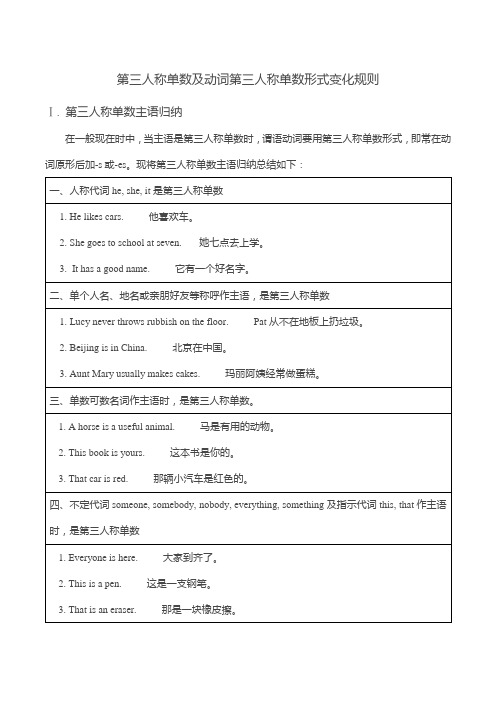
第三人称单数及动词第三人称单数形式变化规则Ⅰ. 第三人称单数主语归纳在一般现在时中,当主语是第三人称单数时,谓语动词要用第三人称单数形式,即常在动词原形后加-s或-es。
现将第三人称单数主语归纳总结如下:Ⅱ. 动词第三人称单数形式变化规则练习及答案一、写出下列动词的第三人称单数。
drink _______ go _______ stay ________ make ________ pass _______ carry_______ come ________ watch _______ fly ________ study_______ brush _______ teach _______ wash_______ guess______ play _______ finish _______二、用括号内动词的适当形式填空。
1. He often ________ (have) dinner at home.2. We _______ (not watch) TV on Monday.3. Nick _______ (not go) to the zoo on Sunday.4. ______ they ________ (like) the World Cup?5. What _______they often _______ (do) on Saturdays?6. _______ your parents _______ (read) newspapers every day?7. The girl _______ (teach) us English on Sundays.8. She and I ________ (take) a walk together every evening.9. There ________ (be) some water in the bottle.10. My aunt _______ (look) after her baby carefully.11. The child often _______ (watch) TV in the evening.12. Su Hai and Su Yang _______ (have) eight lessons this term.答案:一、写出下列动词的第三人称单数。
小学英语一般现在时三单动词的变化规则及练习题

小学英语一般现在时三单动词的变化规则及练习题-CAL-FENGHAI.-(YICAI)-Company One1一般现在时三单动词的变化规则及练习题1.一般情况下,直接加-s 2.以s. x. sh. ch. o结尾,加-es 3.以“辅音字母+y”结尾,变y为i, 再加-es一、写出下列动词的第三人称单数drink ________ go _______ stay ________ make ________ look _____ ____ have_______ pass_______ carry ____ come________ watch___ ___ sing_______ fly ________ study_______ brush________ do_______ __ teach_______二、用括号内动词的适当形式填空。
1. He often ________(have) dinner at home.2. Daniel and Tommy __ _____(be) in Class One.3. We _______(not watch) TV on Monday.4. Nick _______(not go) to the zoo on Sunday.5. What _______they often _______(do) on Sundays?6. _______ your mother _______(read) newspapers every day?7. Mike _______(like) cooking. 8. I _______(be) ill. I’m in bed. 9. Liu Tao _______(do) not like PE. 10. The child often ____ ___(watch) TV in the evening.三、按照要求改写句子1. He watches TV every evening.(改为否定句)___________________________________________________2. I do my homework every day.(改为一般疑问句,作否定回答) ________________________________________________3. She likes books.(改为一般疑问句,做肯定回答)_______________________________________________________ 4. Amy likes playing computer games.(改为一般疑问句,作否定回答) _______________________________________________________ _5. We go to school on Sundays.(改为否定句)_______________________________________________________四、改错(划出错误的地方,将正确的写在横线上)1. Is your brother like English? __________________2. Does he likes swimming? __________________3. He likes play games. __________________4. She don’t do her homework on Sundays. _________________五、把句子补充完整。
五年级三单练习

①在一般现在时中,当主语为第三人称单数时,动词要用“s"型i)在动词尾直接加s。
如:play-plays,want-wants,work—works,know—knows,help—helps,ii)以字母s、x、ch、sh或o结尾的动词加-es;如:guess—guesses,fix—fixes,teach—teaches, wash——washes,go-goes,do-does,watch-watches,catch—catchesiii)以辅音字母+y结尾的动词,先变y为i,再加—es。
如:study—studies,carry—carries,fly—flies,family—families, cry——cries强调如何将主语是第三人称单数的肯定句变为否定和疑问句。
注:1、除三单外,其他人称的特殊疑问句:特殊疑问词加do来提问。
如:What do you have? Where do they live?(除三单外其他人称包括I,we,you,they,my friends,his parents,Mike and Davis,my dogs..。
)2、三单的特殊疑问句:特殊疑问词加does来提问。
如:What does he\she\it\have? Where does your brother\ dog\ friend live?回答用He\ She\ It \My friend live s.。
这时候回答要用动词的S形式。
3、非三单的否定句,直接在动词前面加don't.三单的否定句在动词前面加doesn’t,后面要用动词原形。
即“三单的疑问句和否定句中,有了does,后面要用动词的S形式.4、非三单的一般疑问句用do放句首来引导,三单的一般疑问句用does放句来引导,后面用动词原形。
一般疑问句就是以助动词(do,does)、Be动词(am,is,are)、情态动词(can,may, will,could,等)引导,用YES或NO来回答。
- 1、下载文档前请自行甄别文档内容的完整性,平台不提供额外的编辑、内容补充、找答案等附加服务。
- 2、"仅部分预览"的文档,不可在线预览部分如存在完整性等问题,可反馈申请退款(可完整预览的文档不适用该条件!)。
- 3、如文档侵犯您的权益,请联系客服反馈,我们会尽快为您处理(人工客服工作时间:9:00-18:30)。
动词第三人称单数词尾变化及读音
动词第三人称单数词尾变化有三种形式。
(1)一般动词在词尾加-s,-s在清辅音后读/s/,在浊辅音或元音后读/z/ds读/dz/,ts读/ts/。
如:
help→helps/helps/,know→knows/n uz/,get→gets/gets/,read→reads/ri dz/
(2)以字母s,x,ch,sh或有些以o结尾的动词加-es,-es读/iz/。
如:
guess→guesses/'siz/,fix→fixes/'fiksiz/,teach→teaches/'ti t iz/,wash→washes/'w iz/
注意:go→goes/uz/,do→does/d z/
(3)以辅音字母+y结尾的动词,先变y为i,再加-es,-ies读/iz/。
如:
carry→carries/'k riz/,fly→flies/flaiz/
注:在play→plays/pleiz/,say→says/sez/中,字母y前为元音字母,第三人称单数形式直接在动词后面加-s。
(4)特殊词例外。
如:
be→is,have→has
以不发音字母“e”结尾的开音节词,如果尾音是[s],[z]时,加“s”后字母“e”发音,与所加“s”,一起读做[iz]。
如:
close-closes [iz]
一般现在时练习(一)
一、用词的适当形式填空
1.What time_________ his father_________(do) the work?
2.He _________(get) up at five o’clock.
3.__________ you _________(brush) your teeth every morning?
4.What ________ ( do ) he usually ________( do ) after school?
5.Tom ________ ( study ) English, Chinese, Maths, Science and Art at school.
6. Kitty sometimes __________(go) to the park with his sister.
7.At eight at night, she __________( watch ) TV with her parents.
8. ________ Mike________( read ) English every day?
9.How many lessons________ your classmates______( have ) on Monday?
10.We often___________ ( play ) football in the playground.
二、选择
() 1. _____ you have a book?
A. Do
B. Are
C. Is
D. Have
()2. They _________ on a farm.
A. working
B. is work
C. work
D. is worked
() 3. Does Peter like to watch TV?
__________.
A. Yes, he like
B. No, he doesn’t
C. Yes, he’d like
D. No, he likes ()4. She doesn’t __________ her homework in the afternoon.
A. doing
B. to do
C. does
D. do
()5. How ____________ Mr. Brown ___________ to America?
A. do,go
B. is,go
C. does,go
D. does,goes
()6. Where’s my camera? I____________ it.
A. am not finding
B. am not seeing
C. can’t find
D. can’t look at ()7. How ___________ he go to work?
He ___________ to work by bike.
A. does ;go
B. do;goes
C. do ;go
D. does;goes
()8. ______ you usually late for school?
No, _____________.
A. Do ; I am
B. Does ;not
C. Are ; I’m not
D. Are ; I aren’t
()9. _____ she _____ home at six every day?
A. Is , leave
B. Does , leave
C. Is , leaves
D. Does , left
()10. Mr. Yang ____________ English this term.
A.teaches our
B. teaches us
C. teachs us
D. teach our
一般现在时练习(二)
一、单项选择题
1. Jenny ____ in an office. Her parents ____in a hospital.
A. work works
B. works work
C. work are working
D. is working work
2. One of the boys_____ a black hat.
A. have
B. there is
C. there are
D. has
3. We will go shopping if it____ tomorrow.
A. don't rain
B. didn't rain
C. doesn't rain
D. isn't rain
4. He said the sun ____in the east and ____in the west.
A. rose; set
B. rises; sets
C. rises; set
D. rise; sets
5. Wang Mei ____ music and often ____ to music.
A. like; listen
B. likes; listens
C. like; are listening
D. liking; listen
6. Jenny____ English every evening.
A. has study
B. studies
C. study
D. studied
7. _____Mike from Japan?
A. Are
B. Do
C. Does
D.Is
8. _____you come from Japan?
A. Are
B. Do
C. Does
D.Is
9. What language do you_______?
A. say
B. talk
C. tell
D. speak
10. The elephant likes______her friends and _____grass.
A. play with; eat
B. play with; eats
C. to play with; eat
D. to play with; eats
二、所给动词的正确形式填空
1. I can take Li Ming there when he _____(come) to visit.
2. _____your sister_____(know)English?
3. Her home____ (be) away from her school.
4. The pot_____(not look) like yours very much.
5. Where _____you____(have)lunch every day?
6. Who_____(want)to go swimming?
7. ______she_____(do) the housework every day?
8. Jenny and Danny usually______(play) games in the afternoon .
9. ______you ______(like) English?
10. What______his father_____(do) ?。
